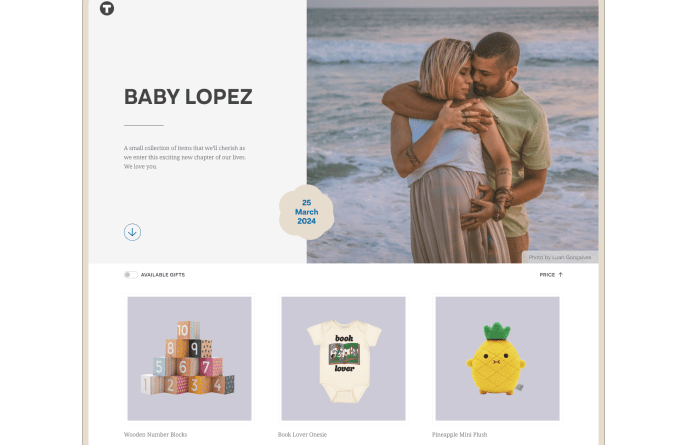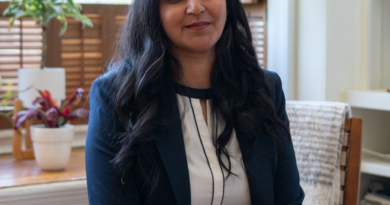Thankful Registry continues its emphasis on thoughtful gift giving
When TechCrunch first covered gift registry platform Thankful Registry eleven years ago, its philosophy was turning the act of asking for gifts into a mindful process, instead of a greedy grab for stuff. Fast forward more than a decade, Thankful continues to lean into that mindset with its relaunch. In addition to a redesign, Thankful also has new features like the ability to send cash with more transfer apps.
When Amazon removed the ability to add items from other sites to its Wishlists and registries in 2023, it opened a new opportunity for Thankful. Founded in 2013, the bootstrapped startup, which is run out of Taipei by Kathy Cheng, wants to become the world’s most popular universal gift registry and wishlist. It also wants to be one of the most beautiful, with an emphasis on design and user experience. As Cheng puts its, “gifting by nature is a social transaction. You can’t simply be an online tool.”
Right now, 80% of active accounts on Thankful are wedding registries, 10% are baby registries and rest were started by nonprofits and general users. Half of its users are in the United States, while the rest are spread out in Australia, Canada, the United Kingdom and the rest of the world. Since Thankful’s soft relaunch in October, 1 in 4 new trial accounts have converted into paid accounts.
Cheng first got the idea for Thankful when a friend got married and Cheng used her Macy’s online registry. She tells TechCrunch that she “hated” the experience. “It was just like a shopping list. Everything was super small, images were super small. It was like you’re just ticking an item off someone’s list. There was no information about the couple, no beautiful photos, no welcome message,” she says.
She set out to build a registry platform that would make asking for gifts and giving them a more meaningful experience. In addition to a focus on design, Thankful also has features, like ones that let people write messages when they buy a gift.
Before its redesign, Thankful’s homepage stayed unchanged for 10 years. The new version was designed by Cheng and Corey Li, a freelance UX designer based in Kaohsiung. Cheng says she wants to update the design and add more functions, including a focus on cash gifts for international users. The new version also makes it easier for users to add gifts to their registries. Before, they used a bookmarklet, but now they can also paste links and upload images.
For countries where cash gifts are popular, Thankful has a Wallet feature that lets people request multi-currency cash gifts through popular direct cash transfer platforms. These include PayID in Australia, Monzo in the United Kingdom, e-Transfer in Canada and Wise for global gifts. In the U.S., available platforms are Stripe, PayPal, Chime, Zelle, Venmo and CashApp. Cheng says one in five gifts given through Thankful is cash.
Cheng notes that gift registries like The Knot, Zola, Joy and Babylist have expanded their registry businesses through dropshipping models, earning money by processing and shipping orders to customers. But Thankful avoids dropshipping because Cheng says she hates the “shop ’til you drop” mentality of registries that encourage people to ask for more items so they can make revenue. Instead, Thankful uses a pricing model with two options. Customers make one-time payments of $60 for a year’s registry or $90 a year for permanent registry.
As a universal gift registry, Thankful is used by many people to add items from small businesses, including mom and pop shops, independent designers and Etsy.

A screenshot of Thankful’s baby registry
“There are so many D2C brands now,” says Cheng. “People are choosing to buy from D2C brands instead of Nordstrom, Bloomingdale’s, Kmart and Target. So you can have somebody who has 20 retailers on their registry page, and that’s all going to look good and work together.”
In addition to wedding and baby registries, Thankful is also used by non-profits to ask to donations. They include Cincinnati Zoo, Clearwater Marine Aquarium, Perth Inner City Youth Services and Refugee Education UK. When Roe v. Wade was overturned by the Supreme Court in June 2022, a lot of donations came through registries for Planned Parenthood. Before that, people asked for donations to go to ACLU when Donald Trump was elected 2016.
“You have to be so flexible and that’s why I think universal is the way to go, but competitors, because their money is made in dropshipping don’t want to go universal,” says Cheng.
Cheng says that even though donation accounts make up less than 2% of total gifts fulfilled on Thankful, the platform has facilitated more than $412,000 in donations so far. About 80% of these donations, or $330,000, have gone to U.S.-based non-profits, with the average amount at around $100. Thankful doesn’t charge transactions or platform fees for donations and gives non-profits and teachers complimentary forever accounts for fundraisers.
The relaunch marks the first time Thankful has updated its pricing model in a decade and one of the reasons is that it is founder-owned and competing against other registries, including ones with venture capital funding like Joy and Zola. Cheng notes Thankful is still less expensive than other rivals like cash-only honeymoon funds Hitchd and Traveler’s Joy.
Cheng says she wants customers to see Thankful as a service that stays with them for different milestones. Many couples first sign up for their weddings, before using Thankful for baby registries. Other users include people who use the platform as evergreen gift lists for their extended families, registries for dog adoptions and lists of things needed for people going through serious illnesses.
“Gifts really touch so many parts of our lives,” says Cheng. “We just want to make it as easy and thoughtful as possible.”




